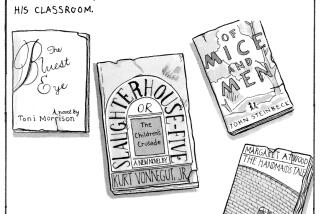Off the Shelf: Walking the walk, talking the talk: A Brit rethinks his text
When I was researching my nonfiction book “The Lost Art of Walking,” I came across this wonderful comic passage in P.G. Wodehouse’s “The Indiscretions of Archie”:
Archie picked up the red-covered volume that lay on the table.
“Half a mo’, old son. Sorry to stop you, but I knew there was something. I’ve just remembered. Your walk. All wrong!”
“All wrong?”
“All wrong! Where’s the chapter on the Art of Walking? Here we are. Listen, dear old soul. Drink this in. ‘In walking, one should strive to acquire that swinging, easy movement from the hips. The correctly-poised walker seems to float along, as it were.’ Now, old bean, you didn’t float a dam’ bit. You just galloped in like a chappie charging into a railway restaurant for a bowl of soup when his train leaves in two minutes. Dashed important, this walking business, you know. Get started wrong, and where are you? Try it again . . .”
I thought this was a hoot and considered using it as an epigraph. But I was writing for an American publisher, and an American audience, and I thought they might be unsettled by those words: “chappie,” “dashed important,” “absolutely . . . what?” I had no idea what they’d make of “half a mo’.”
It wasn’t that I was trying to deny or disguise my own Englishness (as if I could). I just didn’t want to appear too English or the wrong sort of Englishman. Much as I love Wodehouse, I feared that starting out with a big quotation from him might mark me as some tweed-wearing, sherry-drinking monarch lover.
So Wodehouse was left out, and I tried to make my book, if not exactly American, then at least not too noticeably un-American. Of course, I got a lot of help with this, from my editor, my proofreader and, on a daily basis, from my American wife.
Now, though, the wheel has come full circle. The book is going to be published in a U.K. edition and I have to “anglicize” it by cutting out all the pesky American terms and assumptions that won’t be understood by an English audience.
Some of this is straightforward enough. Even the most parochial of us know that in England, a cigarette is called a fag. We know even better that an English fanny is not at all the same thing as an American fanny; front, center, explicit, as opposed to friendly, rear, euphemistic. But certain things take longer to sink in. I still don’t understand why American-English favors “toward” whereas English-English uses “towards,” and I continue to get it wrong when I try to make the distinction between a yard and a garden.
A book about walking presents a few specific problems. An English pavement is the equivalent of an American sidewalk, while what the Americans call a pavement is what the English call a road surface. An Englishman may carry a rucksack when he walks, as opposed to a backpack. Sometimes I’ll use a GPS, which in England is a “sat-nav.”
As part of my book, I went back to England to walk around the neighborhood where I grew up, where I’d walked endlessly as a kid; on an English “council estate.” A council estate is a type of subsidized public housing, similar to but in many essentials very different from an American “project.” An English readership will know exactly what I’m describing, but in order to explain it to American readers I also had to explain it to myself. In thinking about it, I was struck, as I never had been before, by the absurdity of the very word “estate,” which summons up images of vast, open moorlands with roaming deer and wildfowl. The reality is large subdivisions of densely packed row houses, which are called “terraced houses” in England.
I’m not foolish enough to think I’ve got the American language down pat, but I have lived here long enough, and been away from England long enough, that my range of reference has become distinctly American. When I need an example of a likably inept political leader, I tend to think of Gerald Ford as opposed to British Prime Minister John Major, who memorably said, “I am walking over hot coals suspended over a deep pit at the bottom of which are a large number of vipers baring their fangs.” One metaphor too many there, John.
Equally, I’ve learned to enjoy baseball while I’ve been in America, and the occasional baseball metaphor has been known to creep into my writing (touch base, left field, spitball). They’ll very definitely be removed from the English edition. All English sports lovers are required to despise baseball and condemn it as some inferior, mutant form of cricket. I know that’s idiotic, but why alienate English readers unnecessarily?
As you see, in general I’ve made the textual changes willingly enough, in both directions, because I want to be understood. I don’t want the reader to be confused or distracted or simply not know what I’m talking about. But there is a question of how far to go with this. The last thing you want is to become some sort of stateless, free-floating mid-Atlantic author, writing generally rather than specifically. The best writing always involves the local as well as the universal. Even a play like “Waiting for Godot,” which seems to take place in a timeless, featureless no man’s land, contains references to Kapp & Peterson, Dublin’s best-known tobacconist, which supplied Pozzo with his pipe. Kapp & Peterson’s slogan was “The thinking man’s pipe.”
When I first read Bret Easton Ellis’ novel “Less Than Zero,” I wasn’t able to tease out the finer cultural resonances of eating at Fatburger, Chasen’s or Spago. I didn’t know what it meant to hang out in the Sherman Oaks Galleria or to shop for suits at Fred Segal. Cedars-Sinai certainly sounded like an improbable name for a hospital. But it didn’t stop me reading, and if I missed a few bits of information, failed to grasp some references, that’s the way the world is. In real life, we don’t walk around knowing exactly what’s going on the whole time. Why should we when we read a book?
And how about Marcel Proust? Until I read him I’d never even heard of a Madeleine, much less knew what one looked or tasted like. He could surely have broadened his readership if he’d chosen a more widely recognized foodstuff as his memory trigger. American readers would surely have preferred a peanut butter and jelly sandwich, although that wouldn’t have played in England, where the words jam and jelly signify quite different things than they do in America. The English might have preferred a buttered crumpet. And if Proust had really wanted to crack that all-important Korean demographic, he might have chosen stewed kimchi.
That isn’t quite such a random thought as it might seem. Korea is on my mind at the moment, since there’s also going to be a Korean edition of “The Lost Art of Walking,” and even now some brave translator in Seoul is struggling to find local equivalents for a saunter, a stroll, a strut, a hike, an amble, a meander and so on.
Still, he should be grateful he’s not having to translate an epigraph by P.G. Wodehouse.
Nicholson is the author of 14 novels and the nonfiction books “Sex Collectors” and “The Lost Art of Walking.”
More to Read
The biggest entertainment stories
Get our big stories about Hollywood, film, television, music, arts, culture and more right in your inbox as soon as they publish.
You may occasionally receive promotional content from the Los Angeles Times.






